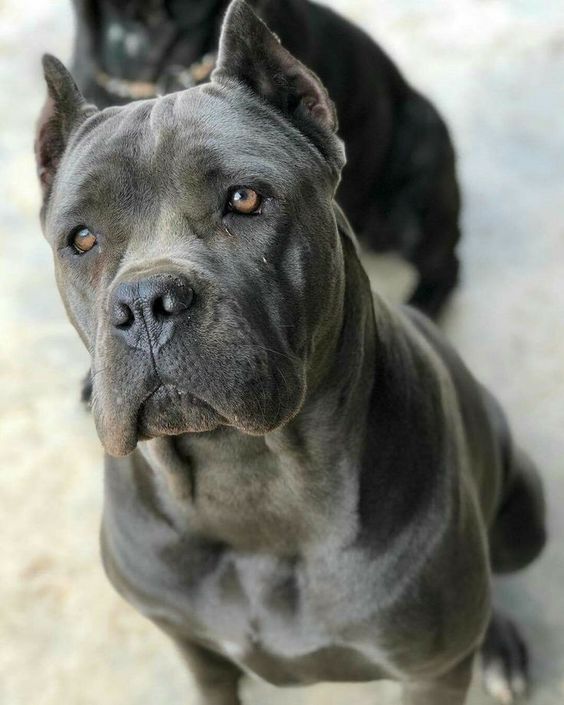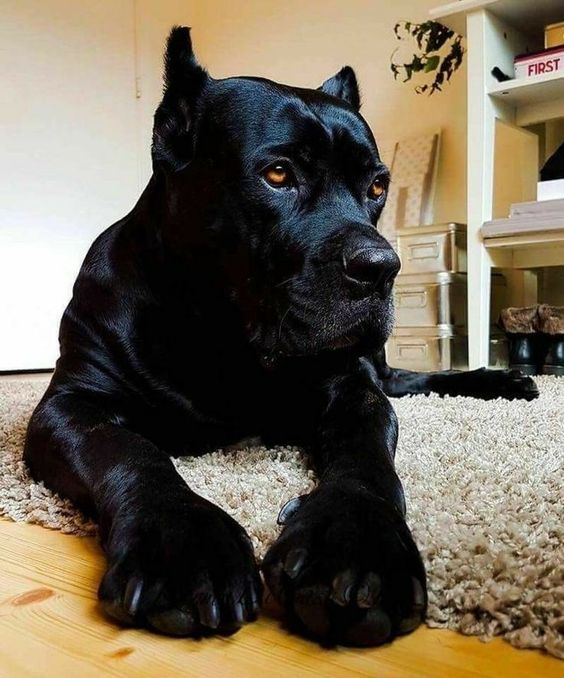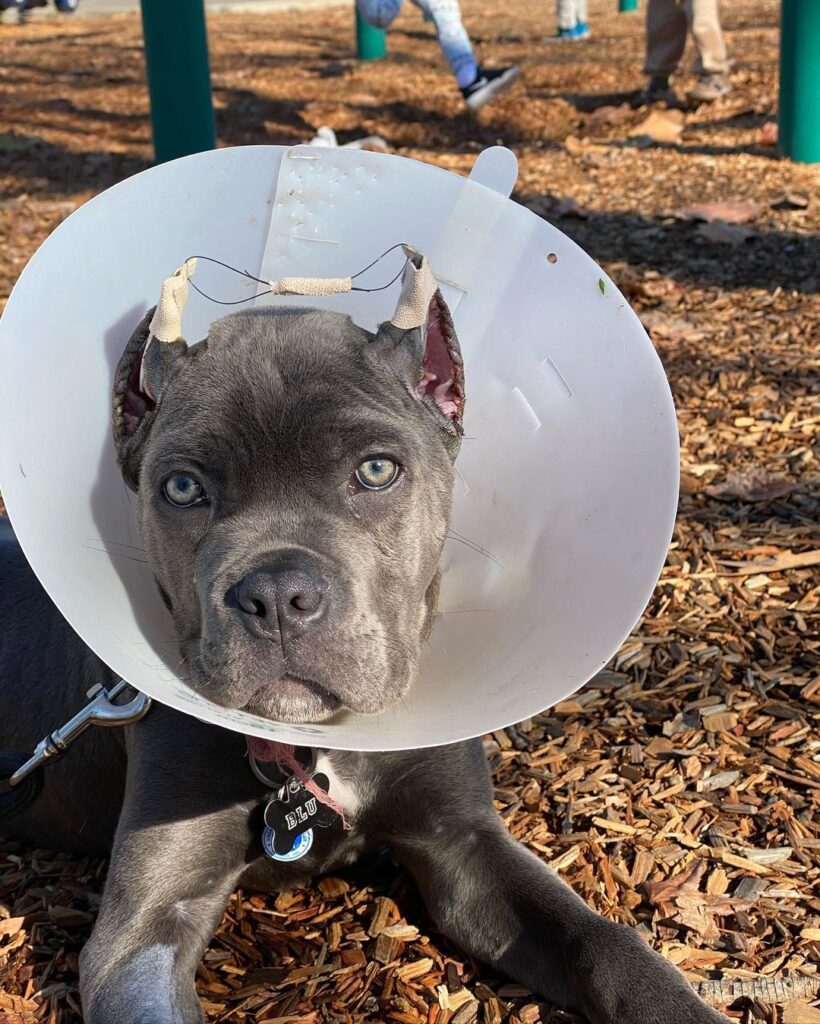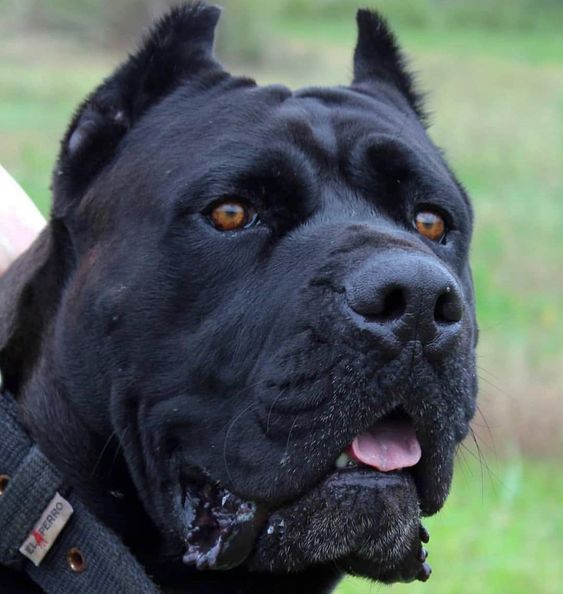
Cane Corsos are magnificent and robust dogs known for their loyalty, strength, and protective nature. However, like all breeds, they are susceptible to certain health issues. In this article, we will delve into the common health problems that can affect Cane Corsos and provide insights into their prevention, management, and treatment. “Cane Corso Health Issues”
Bloat in Cane Corso
Bloat, scientifically termed gastric dilatation-volvulus (GDV), is a menacing health condition that can affect Cane Corsos and other large dog breeds. This ailment occurs when the stomach fills with gas, causing it to expand dramatically. In some severe cases, the stomach can rotate on its axis, leading to the obstruction of blood flow to vital organs. This double-edged sword of bloating and twisting can escalate into a life-threatening emergency within hours.
What is Bloat in Dogs?
Bloat, often referred to as gastric torsion or twisted stomach, is an ailment in which the stomach swells up due to an excessive accumulation of gas and fluids. The twist further compounds the problem by trapping the gas inside. In Cane Corsos, bloat can be particularly hazardous due to their deep chests and large size.
Why are Cane Corsos Prone to Bloat?
Cane Corsos are naturally deep-chested dogs, which leaves them vulnerable to bloat. Their physiological structure provides ample room for the stomach to twist, thus enabling the perfect storm for GDV. Rapid eating, excessive drinking right after meals, consuming a large meal in one sitting, and vigorous exercise around eating times can all contribute to the heightened risk of bloat in Cane Corsos.
How is Bloat Prevented and Treated?
Preventing bloat requires a multi-pronged approach. First, consider feeding multiple small meals throughout the day instead of a single large meal. Slow-feed bowls can help curb rapid eating. Avoid intense physical activity immediately after meals. Raising the food dish slightly from the ground might also help.
Treatment for bloat is a race against time. If you suspect bloat, rush your Cane Corso to a veterinary clinic without delay. Veterinarians may relieve the pressure through a process called gastric decompression and attempt to untwist the stomach. Surgery might also be required to secure the stomach and prevent future recurrences.
Hip Dysplasia in Cane Corso
Hip dysplasia is a well-known health concern that can impact the lives of Cane Corsos and their owners. This condition revolves around the hip joint, a critical component of a dog’s mobility. Hip dysplasia occurs when the hip joint doesn’t develop properly, leading to instability and eventual arthritis. This condition can range from mild discomfort to severe debilitation, affecting a dog’s quality of life.
What is Hip Dysplasia?
Hip dysplasia is a developmental disorder where the hip joint doesn’t fit perfectly into its socket. This misalignment creates friction within the joint, resulting in wear and tear over time. In Cane Corsos, as in other larger breeds, the condition can be exacerbated by their size and weight, making them more susceptible.
How is Hip Dysplasia Diagnosed?
Diagnosing hip dysplasia involves a combination of clinical evaluation and diagnostic imaging. A veterinarian will assess the dog’s gait, behavior, and range of motion, along with X-rays to visualize the hip joint’s structure. X-rays reveal the degree of joint laxity, the presence of arthritis, and any secondary changes in bone shape.
Can Hip Dysplasia be Managed?
While hip dysplasia is not entirely curable, several management strategies can significantly improve a Cane Corso’s quality of life. Weight management is paramount, as excess weight places additional stress on the joints. Low-impact exercises, such as swimming and controlled walks, can help maintain muscle mass and joint function.
Joint supplements, like glucosamine and chondroitin, may provide some relief by promoting joint health. Physical therapy and massage can aid in muscle support around the hip joint, mitigating discomfort. In more severe cases, surgical options, such as hip replacement or femoral head ostectomy, might be considered to alleviate pain and improve mobility.
Understanding the ins and outs of hip dysplasia equips Cane Corso owners with the knowledge needed to detect symptoms early and implement proactive measures. By engaging in responsible care and seeking veterinary guidance, owners can ensure that their beloved companions live their best lives despite the challenges of hip dysplasia.
Cane Corso and Cherry Eye
When it comes to the captivating gaze of Cane Corsos, the last thing you want to see is a condition known as Cherry Eye. This peculiar and concerning eye issue can catch any owner off guard, but understanding its nature and treatment options is essential for the well-being of your furry friend.
What is Cherry Eye?
Cherry Eye is a term used to describe the prolapse of the gland of the third eyelid. This gland, responsible for producing a portion of the eye’s tear film, becomes swollen and appears as a red, fleshy mass at the inner corner of the eye. While it might not be as alarming as some other eye conditions, it’s important to address it promptly.
Can Cherry Eye Resolve on its Own?
In rare cases, Cherry Eye might resolve on its own, but it’s not advisable to rely on this happening. The protruding gland can lead to irritation, dryness, and even more serious eye problems. It’s better to consult a veterinarian as soon as you notice the condition to determine the best course of action.
How is Cherry Eye Treated?
Veterinary intervention is often required to address Cherry Eye effectively. Surgery is a common approach to reposition the gland and secure it back into its normal place. The procedure, while relatively straightforward, should only be performed by a skilled veterinarian experienced in ophthalmic surgery.
During the surgery, the gland is sutured in place to prevent recurrence. It’s crucial to address Cherry Eye promptly to avoid complications like dry eye syndrome, which can occur if the gland isn’t functioning properly.
While Cherry Eye might be a bit of a bump on the road for Cane Corso owners, it’s a manageable condition with the right care. Ensuring your dog receives timely attention from a veterinarian can help restore those striking eyes to their captivating glory and prevent any long-term discomfort.
Entropion and Ectropion in Cane Corso
The world of Cane Corsos is a captivating one, with their noble presence and protective demeanor. However, even these majestic dogs can face certain challenges, and when it comes to their eyes, conditions like Entropion and Ectropion can arise. Understanding these eye issues and their implications is essential for ensuring your Cane Corso’s well-being.
What are Entropion and Ectropion?
Entropion is a condition where the eyelid rolls inward, causing the eyelashes to rub against the cornea. This can result in irritation, redness, and even corneal ulcers. On the flip side, Ectropion is when the eyelid turns outward, leaving the eye exposed and vulnerable to drying out and potential infections.
How do these Conditions Impact the Dog?
Both Entropion and Ectropion can cause significant discomfort to your Cane Corso. Entropion’s inward rolling of the eyelid can lead to constant irritation, a sensation of a foreign object in the eye, and excessive tearing. Ectropion, with the outwardly turned lid, exposes the eye’s sensitive tissues, causing dryness, redness, and increased susceptibility to infections.
These conditions aren’t just physical discomforts; they can also affect your dog’s overall quality of life. Constant discomfort and the potential for chronic eye problems can impact their demeanor and overall well-being.
Can these Eyelid Conditions be Corrected?
The good news is that both Entropion and Ectropion can often be corrected through surgical procedures. Entropion surgery involves adjusting the position of the eyelid to prevent it from rolling inward. Ectropion surgery focuses on repositioning the eyelid to cover the eye properly.
Veterinarians experienced in ophthalmic surgery can perform these procedures with great success. The surgeries not only alleviate the discomfort your Cane Corso is experiencing but also help prevent potential complications that could arise from untreated conditions.
Caring for your Cane Corso means understanding and addressing their unique needs, even when it comes to their eyes. By staying informed about conditions like Entropion and Ectropion, you’re equipped to provide the necessary care to ensure your dog’s continued health and happiness.
Cancer in Cane Corso
In the realm of Cane Corsos, the battle against health issues takes many forms, and unfortunately, cancer is one of them. These noble and powerful dogs, known for their loyalty, are not immune to the complexities of cancer. Understanding the nuances of cancer in Cane Corsos is paramount for their well-being and longevity.
Are Cane Corsos Prone to Cancer?
While Cane Corsos, like all breeds, can be vulnerable to cancer, there isn’t a definitive rule that they are more prone to it. However, larger breeds often have higher cancer rates due to their size and genetics. Various types of cancer, ranging from skin tumors to bone cancer, can affect these majestic dogs.
What are the Signs of Cancer?
Being vigilant about the signs of cancer is crucial for early detection. Look out for unexplained lumps or bumps, changes in behavior, sudden weight loss, persistent lameness, or difficulty breathing. Changes in appetite, lethargy, and abnormal discharge are also potential red flags. If you notice any of these signs, consult a veterinarian promptly.
How is Canine Cancer Treated?
The treatment approach for canine cancer depends on various factors, including the type of cancer, its stage, and the overall health of the dog. Surgery is a common treatment, aiming to remove the cancerous growth and surrounding tissue. Chemotherapy, radiation therapy, and immunotherapy might also be recommended, either alone or in combination.
Pain management and supportive care play a crucial role in the treatment process, ensuring your Cane Corso’s comfort and well-being. The goal of treatment is to improve quality of life and potentially extend it, even in the face of cancer.
Facing cancer with a Cane Corso requires strength, resilience, and a commitment to providing the best possible care. Regular check-ups, early detection, and a partnership with your veterinarian are essential components of this journey. While cancer is a formidable foe, the love and dedication you offer your Cane Corso can make a significant difference in their fight against this complex disease.
Cane Corso Common Allergies

In the world of Cane Corsos, where strength and loyalty reign supreme, even the mightiest canines can find themselves battling an unexpected foe: allergies. These regal dogs are not immune to the itching, discomfort, and frustration that allergies can bring. Understanding the realm of common allergies in Cane Corsos is essential for keeping these noble companions happy and healthy.
What are Common Allergens for Cane Corsos?
Cane Corsos, like any other breed, can develop allergies to a range of substances. Common allergens include pollen from grasses, trees, and weeds. Food allergies can also arise, with proteins like beef, chicken, and dairy being potential triggers. Flea bites, certain fabrics, and even household cleaning products can provoke allergic reactions.
How do Allergies Manifest in Cane Corsos?
Allergies in Cane Corsos can manifest in various ways. One of the most recognizable signs is itching—incessant scratching, licking, and rubbing against furniture are telltale signs. Skin redness, inflammation, rashes, and hair loss can also occur. Ear infections are another common consequence, with the ears becoming red, smelly, and itchy. In some cases, allergies might even lead to gastrointestinal issues.
How can Allergies be Managed?
Managing allergies in Cane Corsos requires a comprehensive approach. Identifying and avoiding allergens whenever possible is the first line of defense. Regular baths using hypoallergenic shampoos can help remove allergens from the skin and coat. Antihistamines and corticosteroids might be prescribed by a veterinarian to provide relief during flare-ups.
If food allergies are suspected, switching to a hypoallergenic or limited ingredient diet might be beneficial. Flea control is essential, as flea bites can exacerbate allergic reactions. Regular grooming to maintain a clean coat can also reduce the accumulation of allergens.
While allergies might seem like a daunting opponent, understanding their triggers and implementing proactive measures can greatly improve the quality of life for your Cane Corso. By remaining attentive to their needs and working closely with a veterinarian, you can ensure that your majestic companion enjoys a life free from the discomfort of allergies.
Health Issues In A Cane Corso Through Different Age
| Age Stage | Common Health Issues |
|---|---|
| Puppy (0-1 year) | Hip Dysplasia |
| Entropion and Ectropion | |
| Cherry Eye | |
| Skin Allergies | |
| Parasite Infections | |
| Adolescent (1-3 years) | Bloat (GDV) |
| Joint Development Issues | |
| Allergies | |
| Dental Issues | |
| Adult (3-7 years) | Hip Dysplasia |
| Cancer (Various Types) | |
| Obesity | |
| Arthritis | |
| Heart Conditions | |
| Senior (7+ years) | Osteoarthritis |
| Cancer (Metastasis) | |
| Vision and Hearing Loss | |
| Kidney and Liver Issues | |
| Cognitive Dysfunction |
FAQs
Q: What are common health issues that Cane Corsos might face?
Answer: Cane Corsos are susceptible to various health issues, including bloat, hip dysplasia, eye conditions like Cherry Eye, skin allergies, and different forms of cancer.
Q: What is bloat in dogs and why are Cane Corsos prone to it?
Answer: Bloat, or gastric dilatation-volvulus (GDV), is when the stomach fills with air and twists, often affecting deep-chested breeds like Cane Corsos due to their anatomy and other factors like rapid eating.
Q: How is hip dysplasia diagnosed in Cane Corsos?
Answer: Hip dysplasia is diagnosed through X-rays that assess the hip joint’s condition. Signs include difficulty in movement, limping, and a decreased activity level.
Q: Can allergies affect Cane Corsos and how do they manifest?
Answer: Yes, allergies are common in Cane Corsos. They can manifest as itching, redness, rashes, and even ear infections due to reactions to allergens like pollen, certain foods, and fleas.
Q: What are the signs of cancer in Cane Corsos?
Answer: Signs of cancer can include lumps or growths, unexplained weight loss, changes in appetite, lethargy, and behavioral changes.
Q: How can eye conditions like Entropion and Ectropion impact Cane Corsos?
Answer: Entropion, where the eyelid rolls inward, and Ectropion, where it turns outward, can cause discomfort, excessive tearing, and potential damage to the eye’s sensitive tissues.
Q: Can Cherry Eye in Cane Corsos resolve on its own?
Answer: While rare, Cherry Eye might self-correct, but veterinary intervention is often necessary to reposition the gland and prevent further complications.
Q: How can bloat in Cane Corsos be prevented and treated?
Answer: Preventing bloat involves feeding multiple small meals, avoiding exercise around mealtime, and recognizing early signs like restlessness and unproductive vomiting. Treatment often requires surgery.
Q: Are Cane Corsos more prone to certain types of cancer?
Answer: Cane Corsos, like many large breeds, are at risk for various types of cancer. Regular check-ups and early detection are crucial.
Q: How can allergies in Cane Corsos be managed?
Answer: Managing allergies includes identifying and avoiding triggers, regular baths using hypoallergenic shampoos, and consulting a veterinarian for prescribed medications and advice.
Conclusion
As we navigate the intricate journey of caring for our beloved Cane Corsos, it’s essential to remain vigilant and well-informed about the spectrum of health challenges they might encounter. From their playful puppy days to the dignified senior years, these magnificent companions can face a range of common health issues that require our attention and care. Whether it’s the developmental concerns like hip dysplasia and joint issues during their adolescent phase, the potential eye conditions like entropion and ectropion that might arise, or the looming threat of cancer and arthritis in their adult and senior years, staying proactive is key.
With over 4 years of devoted companionship with my beloved Labrador Retriever, Robin, I have cultivated a deep understanding and expertise in all things canine. From training and behavior to health and well-being.


